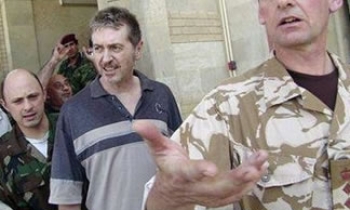For most of us in the news business, our thoughts, best wishes, prayers and hopes are pulling for the recovery of ABC News co-anchor Bob Woodruff and cameraman Doug Vogt.
The pair was seriously injured in Iraq Sunday when an armored vehicle in which they were riding ran over a homemade bomb. Woodruff reportedly suffered broken ribs, a broken shoulder and a skull fracture.
So far, there has been no hard information and, admirably, precious little speculation about whether the injuries mean an abrupt end to Woodruff's promising career as a network anchor.
But there has been no shortage of commentary and punditry on whether there is value in having a high-profile news personality working as a war correspondent, as well as reflections on why reporters in general take on dangerous war assignments.
I took sides even before Woodruff's injury.
When I introduced Dan Rather for his speech at McCaw Hall last week, I intentionally decided against focusing on the sour and embarrassing note that ended his long career as a network anchor.
Unaware there would be a severe war-zone casualty involving another network anchor a mere five days later, I spoke instead about important, far-flung and often dangerous assignments that had marked Rather's tenure with CBS.
Having watched him on TV even before he joined the network more than four decades ago, I spoke in complimentary terms about Rather being a news anchor who didn't just read the news but who often reported it.
I reminisced about watching him when I was a teenager in Houston and he worked at a local station, recalling how he reported from the Galveston Island seawall about Hurricane Carla when it blew into the Texas coast in 1961.
I mentioned that he had covered wars in Vietnam, Afghanistan and Iraq, and reported important news stories from points around the globe.
Rather, in his remarks that night, bemoaned what he sees as an unfortunate decline in quality foreign reporting by U.S. news organizations. He noted that major news organizations have closed foreign bureaus, and often find themselves lacking in an understanding of history, culture and perspective when they drop into unfamiliar foreign hotspots for big news developments.
At least partly for that reason, people around the world know much more about us than we as Americans know about them.
Rather seemed to appreciate my words of introduction that evening, and I certainly found myself agreeing with much of what he said in his speech to the seemingly appreciative audience.
So, I found it perplexing and disappointing to read so many of our journalistic colleagues suggesting on Web sites and in professional journals a few days later that anchors shouldn't be reporting, or suggesting that Woodruff's assignment in Iraq was all about ratings, not substance.
Anyone who seriously thinks that needs a dose of reality.
Iraq has been an extremely dangerous assignment for news people. According to the Freedom Forum, more journalists have been killed covering the second Iraq war than in all the U.S. wars of the past 70 years except World War II. At 63 and counting, that death toll is three short of the journalist deaths in World War II, the past century's deadliest for those who go into war zones to witness, photograph and report. Another 37 journalists have been abducted, according to the Committee to Protect Journalists.
With the unpredictable and seemingly uncontrollable insurgency, even some veteran foreign and war correspondents who say they are anesthetized to danger, and others who admit they get an adrenaline rush from it, say they want no part of an assignment there.
If it was just showbiz, Woodruff could have found lots of nicer and safer places than Iraq to pan for the camera.
Woodruff, 44, is now back in the United States at a naval hospital in Bethesda, Md. Reportedly, he has opened his eyes briefly and is being slowly brought out of sedation. Vogt, who was less seriously injured, reportedly is talking to family and friends, according to a hospital spokeswoman.
"We are very encouraged overall for the both of them," ABC News President David Westin said this week.
We hope the two journalists will continue to improve, and brave men and women will continue to try and help us understand the complex world in which we live.
Kenneth F. Bunting is associate publisher. E-mail: kenbunting@seattlepi.com.









